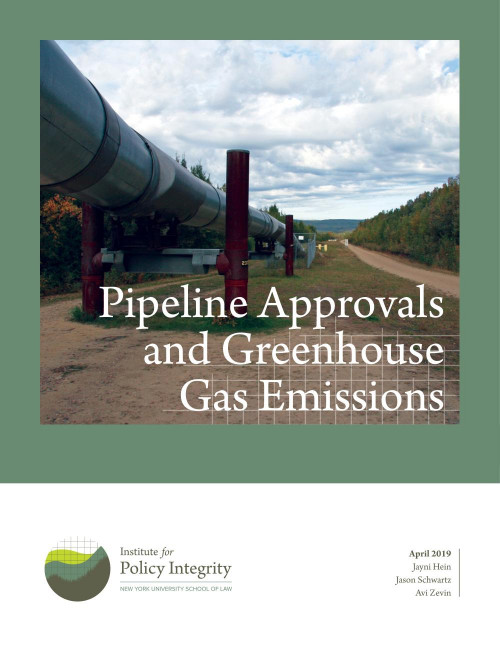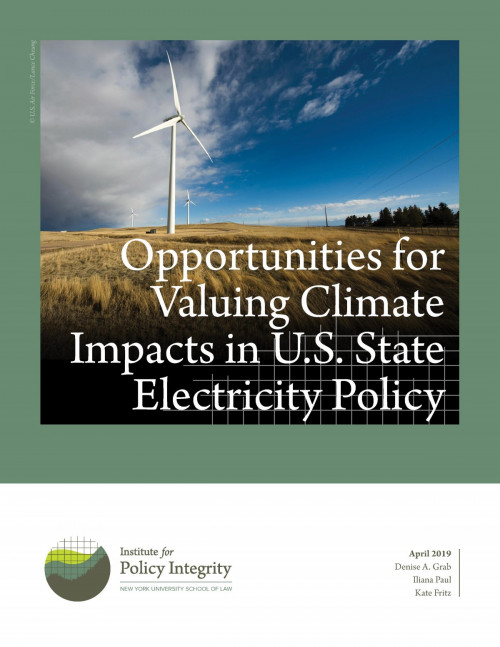-
Amicus Brief in Atlantic Coast Pipeline Case
If constructed, the Atlantic Coast Pipeline Project would be responsible for greenhouse gas emissions resulting in over $1.3 billion per year of climate damages. The Federal Energy Regulatory Commission’s (FERC) analysis estimates the quantity of the project’s emissions but does not analyze the context, intensity, or significance of the incremental climate damages they will cause. We submitted an amicus brief to the U.S. Court of Appeals for the D.C. Circuit that explains how FERC’s failure to monetize the project’s climate damages using Social Cost of Carbon (SCC) estimates is arbitrary.
-
Court Overturns Repeal of Valuation Rule
The Institute for Policy Integrity helped contribute to a significant legal victory, as a federal district court in California today overturned the Trump administration’s repeal of the Interior Department’s Valuation Rule. The Valuation Rule sought to ensure that states and the federal government receive the full value of royalties due for oil, gas, and coal extracted from public lands. While the administration has lost numerous court cases related to deregulation, this is the first decision overturning a repeal of a rule. Policy Integrity submitted an amicus brief in the case and comments on the original rule and the repeal efforts.
In our amicus brief, we argued that the repeal was unreasonable because of the agency’s inaccurate assessment of the repeal’s economic impact. District Judge Saundra Brown Armstrong’s opinion echoed some of the arguments from our brief and cited an academic article on deregulation written by Bethany Davis Noll and Denise Grab.
-

Pipeline Approvals and Greenhouse Gas Emissions
In light of growing public awareness of the environmental effects of pipeline projects, the Federal Energy Regulatory Commission (FERC) has faced competing pressures regarding how to balance the need for new natural gas pipelines with their environmental consequences. Concerns about greenhouse gas (GHG) emissions and resulting climate change effects have become a flashpoint in the debate. Our report examines the legal context surrounding FERC’s evaluation of the environmental impacts of proposed interstate natural gas pipelines. We look at FERC’s obligations under the Natural Gas Act and the National Environmental Policy Act, as well as potential improvements the agency can make to its analyses to better inform policy makers and the public about the impacts of proposed projects.
-
Amicus Brief on the Good Neighbor Provision of the Clean Air Act
The Clean Air Act includes a Good Neighbor Provision, which requires states to prohibit their own sources of pollution from emitting in quantities that “contribute significantly” to another state’s inability to achieve national ambient air quality standards. When upwind states fail to abide by this requirement, the Act authorizes downwind states to petition the Environmental Protection Agency (EPA) for relief.
In 2018, EPA denied five such petitions filed by Maryland and Delaware, which sought tighter limits on ozone-forming emissions from power plants in Indiana, Kentucky, Ohio, Pennsylvania, and West Virginia. Maryland and Delaware, supported by other states and a coalition of environmental groups, have now challenged those denials in the U.S. Court of Appeals for the D.C. Circuit. In our amicus brief supporting the challenges, we focused on EPA’s erroneous claim that no further emission reductions at the specified plants would be cost-effective.
-
Amicus Briefs on Harmful Changes to Title X Women’s Health Services
The Department of Health and Human Services (HHS) issued a final rule that makes detrimental revisions to the federal Title X program, which funds free or low-cost reproductive health services for millions of women each year. HHS would impose onerous restrictions that will likely force the shutdown of key health clinics that rely on federal funding. We submitted an amicus brief to the U.S. District Court for the Northern District of California in support of the plaintiff’s motions for preliminary injunction. Plaintiffs argue that the final rule is arbitrary and capricious because HHS failed to accurately assess the rule’s health costs, compliance costs, and alleged benefits. Our brief provides the court with context on the legal and economic standards for regulatory impact analysis to detail how HHS’s assessment of the rule thoroughly flunks those standards.
We also filed briefs in Title X cases in the District of Oregon, Eastern District of Washington, and District of Maine.
-
Comments to the FCC on Regulation of Space Debris
The Federal Communications Commission (FCC) is seeking comments on economic approaches that might be feasible and effective in reducing the negative impacts of orbital debris in space. We submitted comments offering initial suggestions for what the Commission might consider in choosing a market-based regulation. We also recommend that any impact assessment of the regulation takes into account the full range of direct and indirect benefits.
-

Opportunities for Valuing Climate Impacts in U.S. State Electricity Policy
With an absence of federal leadership on climate change, many states have worked to reduce greenhouse gas emissions on their own, often by incorporating a broader range of considerations into electricity policy. Our report assesses the potential to expand the valuation of climate damages in state electricity policy using Social Cost of Carbon metrics. We examine existing statutes and regulations in all 50 states to identify opportunities for valuing climate impacts around the country.
-
Colorado Senate Testimony on the Social Cost of Carbon
Colorado is considering a major overhaul of its electric resource planning rules and renewable energy standards. Jason Schwartz recently provided testimony in a Senate hearing on the reauthorization of the state’s Public Utilities Commission as part of this overhaul. Schwartz spoke about a possible requirement for the PUC to weigh the social costs of pollution in its decisions. Coloradoans, he explained, are paying the costs of climate pollution in the form of more dangerous wildfires, agricultural damages, declining snowpack, and a range of severe health effects. Many of these important costs can be quantified. In his testimony, Schwartz recommended that the PUC uses Social Cost of Greenhouse Gases metrics when evaluating energy resources in order to improve public welfare.
-
Comments to EPA on Revised Emissions Standards for New Power Plants
The Environmental Protection Agency (EPA) recently proposed a significant weakening of greenhouse gas emissions standards for new coal-fired power plants. We submitted comments focusing on flaws in the proposal and accompanying regulatory impact analysis.
-
New Tracking Resource: Health and Environmental Benefits Threatened by Deregulation
Our new tracking resource tallies the benefits to public health and the environment that are at risk due to regulatory repeals, delays, and revisions. Since 2017, numerous environmental rules have been the subject of the Trump administration’s deregulatory agenda. The original rules highlighted in our document were economically justified, meaning each was supported by a detailed account of its monetized benefits to the American public, which outweighed projected costs. Now, as the administration works to undo these rules, a wide range of crucial benefits could be lost. Our resource provides information on the kinds of benefits at risk, monetized gross and net benefit estimates, and other unquantified health and environmental effects of several federal rules.






